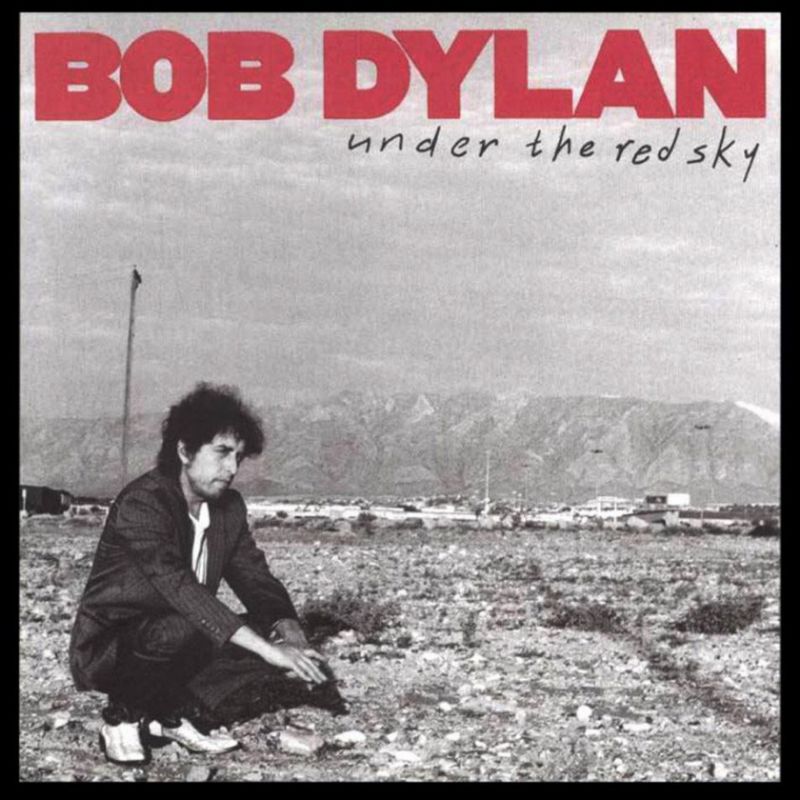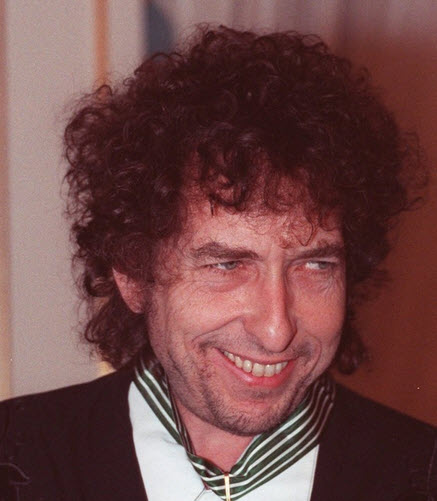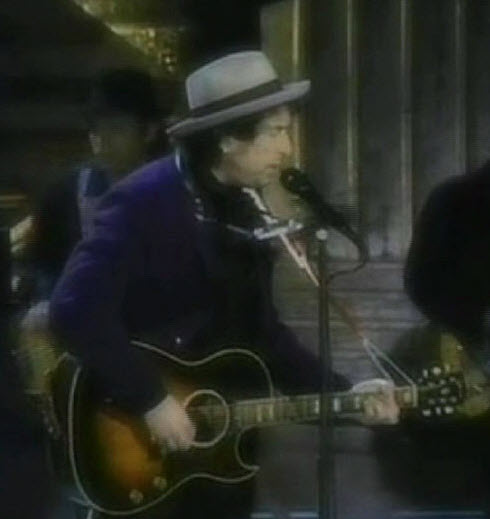[vc_row][vc_column][vc_message message_box_color=”mulled_wine” icon_fontawesome=”fa fa-quote-left”]“It’s just another record,” [Dylan says of Red Sky] “You can only make the records as good as
you can and hope they sell.”
~Bob Dylan (to Edna Gundersen, Aug 1990)
I made this record, Under the Red Sky, with Don Was, but at the same time I was also doing the Wilburys record. I don’t know how it happened that I got into both albums at the same time.
~Bob Dylan (to Jonathan Lethem, Aug 2006)
Anyway, Leadbelly did most of those kind of songs. He’d been out of prison for some time when he decided to do children’s songs and people said oh, why did Leadbelly change? Some people liked the old ones, some people liked the new ones. Some people liked both songs. But he didn’t change, he was the same man! Anyway, this is a song called …, It’s a new song I wrote a while back. I’m gonna try and do it as good as I can. there’s somebody important here tonight who wants to hear it, so we’ll give it our best …
– preface to ‘Caribbean Wind’, Warfield Theatre, San Francisco, November 12, 1980[/vc_message][/vc_column][/vc_row]
Born In Time (with Eric Clapton, 1999):
From wikipedia:
| Released | September 10, 1990 |
|---|---|
| Recorded | Early 1990 |
| Genre | Rock |
| Length | 35:21 |
| Label | Columbia |
| Producer | “Jack Frost” (Bob Dylan), Don Was, and David Was |
Under the Red Sky is the twenty-seventh studio album by American singer-songwriter Bob Dylan, released in September 1990 by Columbia Records.
The album was largely greeted as a strange and disappointing follow-up to 1989’s critically acclaimed Oh Mercy. Most of the criticism was directed at the slick sound of pop producer Don Was, as well as a handful of tracks that seem rooted in children’s nursery rhymes. It is a rarity in Dylan’s catalog for its inclusion of celebrity cameos, by Slash, Elton John, George Harrison, David Crosby, Stevie Ray Vaughan and Bruce Hornsby.
Reception:
Dylan has echoed most critics’ complaints, telling Rolling Stone in a 2006 interview that the album’s shortcomings resulted from hurried and unfocused recording sessions, due in part to his activity with the Traveling Wilburys at the time. He also claimed that there were too many people working on the album, and that he was very disillusioned with the recording industry during this period of his career.
- Dylan critic Patrick Humphries, author of The Complete Guide to the Music of Bob Dylan, was particularly harsh in his assessment of Under the Red Sky, stating the album “was everything Oh Mercy wasn’t—sloppily written songs, lazily performed and unimaginatively produced.
- The album did have some critical support, particularly from Robert Christgau of The Village Voice, who wrote “To my astonishment, I think Under the Red Sky is Dylan’s best album in 15 years, a record that may even signal a ridiculously belated if not totally meaningless return to form…It’s fabulistic, biblical…the tempos are postpunk like it oughta be, with [Kenny] Aronoff’s sprints and shuffles grooving ahead like ’60s folk-rock never did.”
- Paul Nelson, writing for Musician, called the album “a deliberately throwaway masterpiece.”
God Knows (Woodstock, 1994):
More opinions:
[vc_row][vc_column][vc_message message_box_color=”mulled_wine” icon_fontawesome=”fa fa-quote-left”]under the red sky seems to oppress an awful lot of Dylan fans. Some particularly infantile criticism has been directed at its self conscious use of nursery rhyme-like constructions, largely from people entirely ignorant of nursery rhymes’ centuries-old role in the folk tradition. Dylan certainly received little credit for daring to make a gut-bustin’ R&B record less than a year after leaving the swamplands of Lanoisville. Whatever its failings, the album conveys a real unity of purpose. What it lacked was one song that raised things to a higher plane, preferably at the expense of an album-opener that went, ‘Wiggle wiggle wiggle, like a bowl of soup.’
-Clinton Heylin (from “Still On The Road…”)[/vc_message][/vc_column][/vc_row]
[vc_row][vc_column][vc_message message_box_color=”mulled_wine” icon_fontawesome=”fa fa-quote-left”]This Was Bros. pseudothrowaway improves on the hushed emotion, weary wisdom, and new-age “maturity” of the Daniel Lanois-produced Oh Mercy even if the lyrics are sloppier–the anomaly is what Lanois calls Oh Mercy’s “focused” writing. Aiming frankly for the evocative, the fabulistic, the biblical, Dylan exploits narrative metaphor as an adaptive mechanism that allows him to inhabit a “mature” pessimism he knows isn’t the meaning of life. Where his seminal folk-rock records were cut with Nashville cats on drums–Kenny Buttrey when he was lucky, nonentities when he wasn’t–here Kenny Aronoff’s tempos are postpunk like it oughta be, springs and shuffles grooving ever forward. The fables are strengthened by the workout, and as a realist I also treasure their literal moments. I credit his outrage without forgetting his royalty statements. I believe he’s gritted his teeth through the bad patches of a long-term sexual relationship even if he still measures the long term in months. And when he thanks his honey for that cup of tea, I melt.
-Robert Christgau[/vc_message][/vc_column][/vc_row]
[vc_row][vc_column][vc_message message_box_color=”mulled_wine” icon_fontawesome=”fa fa-quote-left”]The first Dylan album after Oh Mercy shows Dylan characteristically retreating from that album’s mainstream production values and safe terrain, and refusing to offer a
follow-up. Nevertheless his penchant for recently modish producers has him turn this time to DAVID & DON WAS of Was Not Was, who offer a rougher and less unified sound. It’s a pity Dylan pads out the album with some sub-standard rockism(‘Wiggle Wiggle’ and ‘Unbelievable’) and the ill-fitting, foggy pop of ‘Born in Time’, because the core of the album is an adventure into the poetic
possibilities of nursery rhyme that is alert, fresh and imaginative, and an achievement that has gone largely unrecognised.
-Michael Gray (Bob Dylan Encyclopedia)[/vc_message][/vc_column][/vc_row]
[vc_row][vc_column][vc_message message_box_color=”mulled_wine” icon_fontawesome=”fa fa-quote-left”]It’s a magnificent album, really, and I love every performance on it. Oh, there have been times over the years when I’ve had my doubts about “10,000 Men” or “2×2,” but as with a good concert, each performance in sequence opens doors in listener and singer and musicians and, because the whole is greater than the sum of the parts, the parts are elevated in dignity and expressive power just by their connectedness to that whole. So I find myself getting into the groove of “10,000 Men,” the easy flow of the language, the surprising shouts and whispers of the vocal, the irrepressible Under the Red Sky humor that chugs along throughout (and catches my attention at different moments every time I listen).
-Paul Williams (Bob Dylan: Performance Artist 1986-1990 And Beyond)[/vc_message][/vc_column][/vc_row]
[vc_row][vc_column][vc_message message_box_color=”mulled_wine” icon_fontawesome=”fa fa-quote-left”]Dylan followed Oh Mercy, his most critically acclaimed album in years, with Under the Red Sky, a record that seemed like a conscious recoil from that album’s depth and atmosphere. By signing Don Was, the king of mature retro-rock, as producer, he guaranteed that the record would be lean and direct, which is perhaps exactly what this collection of simplistic songs deserves. Still, this record feels a little ephemeral, a collection of songs that Dylan didn’t really care that much about. In a way, that makes it a little easier to warm to than its predecessor, since it has a looseness that suits him well, especially with songs this deliberately lightweight. As such, Under the Red Sky is certainly lightweight, but rather appealing in its own lack of substance, since Dylan has never made a record so breezy, apart from (maybe) Down in the Groove. That doesn’t make it a great, or even good, record, but it does have its own charms that will be worth searching out for Dylanphiles.
-Stephen Thomas Erlewine (allmusic.com)[/vc_message][/vc_column][/vc_row]
All songs written by Bob Dylan.
- “Wiggle Wiggle” – 2:09
- “Under the Red Sky” – 4:09
- “Unbelievable” – 4:06
- “Born in Time” – 3:39
- “T.V. Talkin’ Song” – 3:02
- “10,000 Men” – 4:21
- “2 × 2” – 3:36
- “God Knows” – 3:02
- “Handy Dandy” – 4:03
- “Cat’s in the Well” – 3:21
–
My fav songs from the album:
- Born In Time
- God Knows
- Under The Red Sky
–
Personnel
- Bob Dylan – acoustic and electric guitar, piano, accordion, harp, vocals, production
- Additional musicians
- Kenny Aronoff – drums
- Sweet Pea Atkinson – backing vocals
- Rayse Biggs – trumpet
- Sir Harry Bowens – backing vocals
- David Crosby – backing vocals
- Paulinho Da Costa – percussion
- Robben Ford – guitar
- George Harrison – slide guitar
- Bruce Hornsby – piano
- Randy “The Emperor” Jackson – bass guitar
- Elton John – piano
- Al Kooper – organ, keyboards
- David Lindley – bouzouki, guitar, slide guitar
- David McMurray – saxophone
- Donald Ray Mitchell – backing vocals
- Jamie Muhoberac – organ
- Slash – guitar
- Jimmie Vaughan – guitar
- Stevie Ray Vaughan – guitar
- Waddy Wachtel – guitar
- David Was – backing vocals, production
- Don Was – bass guitar, production
- Technical personnel
- Dan Bosworth – assistant engineering
- Marsha Burns – production coordination
- Ed Cherney – engineering, mixing
- Steve Deutsch – assistant engineering
- Judy Kirshner – assistant engineering
- Jim Mitchell – assistant engineering
- Brett Swain – assistant engineering
It’s Unbelievable:
Album of the day:
[vc_row][vc_column][vc_separator][vc_btn title=”Alldylan / Borntolisten @ Facebook” color=”blue” i_icon_fontawesome=”fa fa-facebook-official” add_icon=”true” link=”url:https%3A%2F%2Fwww.facebook.com%2FJohannasVisions%2F||target:%20_blank|”][/vc_column][/vc_row][vc_row][vc_column][vc_message message_box_style=”outline” icon_fontawesome=”fa fa-link” css_animation=”bounceIn”]Check out:
- Bob Dylan: Concerts & Videos from 1996 – 1999 @ Alldylan.com
- Bob Dylan: 10 concert videos you MUST see from the 90’s
- –
- Karl Erik’s expectingrain.com
- Olof’s “Still On The Road“
[/vc_message][/vc_column][/vc_row]
-Egil




oh babe that fire is still smoking